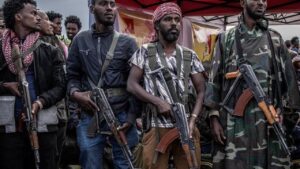Ethiopia declares nationwide state of emergency as rebels advance

Ethiopia declared a state of emergency on Tuesday as rival forces from the northern region of Tigray move toward the capital prepared for a possible military assault. The two sides have been at war for almost a year though the conflict has mostly been confined to the north of the country. It has recently spread further south and fighting has sharply escalated in the past few days.
It’s the latest escalation of a yearlong civil war that threatens to tear apart Africa’s second-most populous country and has killed thousands of citizens.
The state of emergency is effective immediately and is slated to last about six months, according to AP.
Under the state of emergency, Prime Minister Abiy Ahmed can impose curfews, order citizens into military service and restrict the news media.

“The state of emergency is aimed to protect civilians from atrocities being committed by the terrorist TPLF group in several parts of the country,” state-affiliated media reported on Tuesday, referring to the Tigray People’s Liberation Front that ruled the country for three decades until 2018.
The declaration of a state of emergency came after Abiy Ahmed, Ethiopia’s prime minister, called on citizens to take up arms to against what he said was a TPLF advance that threatened to “push the country to its demise”. Getachew Reda, a senior member of the TPLF, said that the Ethiopian army had been routed from Tigray. “If the government falls, we will definitely have an interim arrangement,” Reuters quoted him as saying.

Thousands of people are believed to have been killed and more than 2m to have fled their homes since a civil war erupted in November last year when Abiy, a Nobel Peace laureate, sent troops to quell unrest in Tigray after what he said was an attack on Ethiopian forces by troops loyal to the TPLF. The sharp escalation of the 12-month conflict came after fighters from the northern Tigray region said they had captured the strategic towns of Dessie and Kombolcha in the neighbouring Amhara region. In some areas, Tigrayan forces are allegedly fighting alongside rebels from the OLA, an outlawed splinter group of the Oromo Liberation Front.
The TPLF says it is fighting in Amhara to prevent what it alleges is a government blockade to prevent food and humanitarian supplies reaching Tigray, where up to 5m people need urgent food relief and at least 400,000 are in famine-like conditions, according to the UN. But the strategic towns are also close to the road that links Addis Ababa with Djibouti, the port through which the majority of Ethiopia’s imports and exports are shipped.
The government has accused the TPLF of escalating violence and committing human rights abuses, including the execution of dozens of civilians, a charge the TPLF has denied. The conflict has been characterised by a propaganda war in which both sides have accused each other of gross human rights violations. Abiy has consistently referred to the TPLF, which effectively ran the country for almost three decades until he took over in 2018, as a terrorist force.
The US secretary of state Antony Blinken expressed alarm over the escalating conflict. In a tweet on Monday, he said: “Continued fighting prolongs the dire humanitarian crisis in northern Ethiopia. All parties must stop military operations and begin ceasefire negotiations without preconditions.” Washington is believed to be on the verge of suspending Ethiopia from the African Growth and Opportunity Act (Agoa), under which it exports textiles and other goods tariff free to the US. The US imposed sanctions in September on unspecified members of the Ethiopian government and other warring parties, including those from the neighbouring country of Eritrea, which has fought alongside Ethiopian troops and militia from the Amhara region.
The TPLF’s rule came to an end in 2018 when Abiy became prime minister after years of anti-government protests. Relations between Abiy and the TPLF then progressively deteriorated after Abiy dissolved the coalition, formed a new governing party and postponed national elections in 2020.





